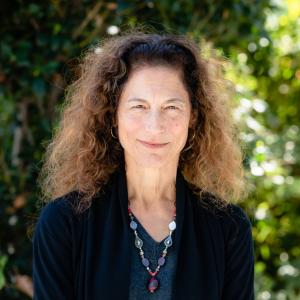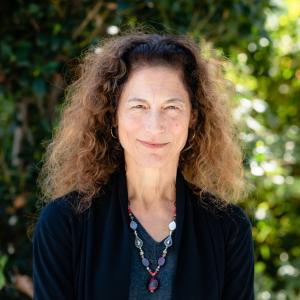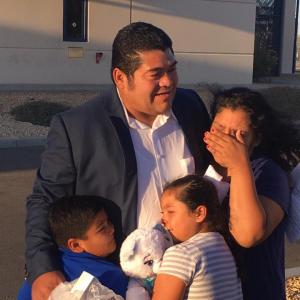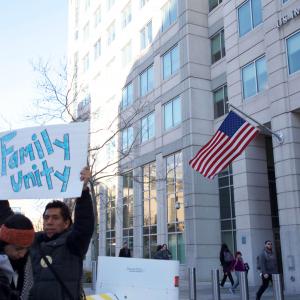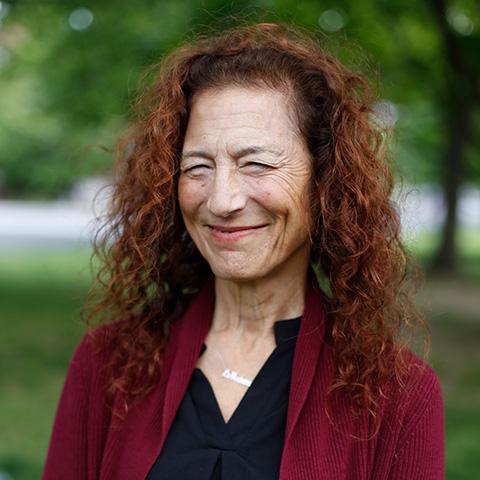
Rev. Alexia Salvatierra, a pastor in the Evangelical Lutheran Church in America, is academic dean of Centro Latino and associate professor of mission and global transformation at Fuller Theological Seminary in California. She serves as co-chair of Sojourners' board.
She is co-author of three books: Faith-Rooted Organizing: Mobilizing the Church in Service to the World (with Peter Heltzel), Buried Seeds: Learning from the Vibrant Resilency of Marginalized Christian Communities (with Brandon Wrencher), and God's Resistance: Mobilizing the Church to Defend Immigrants (with Robert Chao Romero, Brad Christerson, and Nancy Yuen). She has over 40 years of experience in congregational (English and Spanish) and community ministry, including church-based service and community development programs, congregational/community organizing and legislative advocacy. She serves as a consultant (training, facilitating, organizing and leading strategic planning) for a variety of national/international organizations, including World Vision, Intervarsity Christian Fellowship, and the Christian Community Development Association.
She has been a national leader in the areas of working poverty and immigration for over 25 years, including co-founding the national Evangelical Immigration Table in 2011, the 2007 New Sanctuary Movement, the Guardian Angels project for unaccompanied migrant minors in 2014, and Matthew 25/Mateo 25 in 2016.
From 2011-2014, she served as the director of justice for the Southwest California Synod of the ELCA under Bishop Nelson. From 2000 to 2011, she was the executive director of Clergy and Laity United for Economic Justice, beginning as the director of CLUE in Los Angeles and then as the first CLUE-CA director. CLUE-CA is a statewide alliance of organizations of religious leaders who come together to respond to the crisis of working poverty by joining low-wage workers in their struggle for a living wage, health insurance, fair working conditions, and a voice in the decisions that affect them. Under Alexia’s leadership, CLUE-CA became known for its young leaders’ project, the New Sanctuary Movement, and the “Our Children” project in Orange County which engaged immigrant and non-immigrant evangelical congregations in joint ministry to immigrant youth facing deportation.
Before CLUE-CA, Rev. Salvatierra founded multiple programs and organizations, in the U.S. and overseas. These included a gang prevention program for at-risk immigrant youth, a community computer center and an intergenerational community garden where the elderly taught at-risk youth to grow produce for sale as well as a collaborative of UC students; homeless leaders and congregation members providing emergency services in the streets of Santa Cruz, Calif.; and the migrant farmworker camps in Watsonville, Calif. She was founding director of the Berkeley Ecumenical Chaplaincy to the Homeless, a program that integrated social services, community organizing, pastoral care, and economic development for the homeless that was replicated in six U.S. cities. In the Philippines, she trained urban poor women in Manila to serve as chaplains to their neighbors.
She has been awarded the Fuller School of Intercultural Studies 2019 David Allan Hubbard Achievement Award, the Changemaker award from the Liberty Hill Foundation, the Stanton Fellowship from the Durfee Foundation, the Amos Award from Sojourners, the Giants of Justice award from CLUE LA, and the Prime Mover fellowship from the Hunt Alternatives Fund.
Posts By This Author
Seeing Roe v. Wade Through Hispanic Eyes
HISPANIC CULTURES ARE profoundly relational. Family is family whoever they are, whatever they believe, and whatever they have done. Family also includes people who are not blood relations; being family is a way of life. Being family means that the suffering of our daughters and our mothers, our sisters and our cousins, matters. Our relationship with God also matters to us, and how we see and sense the voice of God influences our choices.
So, what does this all mean when it comes to abortion?
Whether or not Hispanics fight to affirm Roe v. Wade, our fundamental perspectives may not fit neatly into the two sides of the debate. While some values are shared across generations, they are differently weighted in ways that impact political decisions, creating a family dialogue that is profound and deeply emotional.
A core precept of liberation theology in Latin America, and its evangelical cousin misión integral (holistic mission), is the power of place and position in determining perspective. While it is not possible to talk about a single “Hispanic culture,” given the broad diversity of the Hispanic community, there are common experiences and values between various Hispanic cultures that impact the way that we see the moral, scriptural, and spiritual issues in the abortion/choice debate.
The following formative experiences and values have significant impact for many of us.
Seeing God in babies. I remember when I was a pastor of an English- and Spanish-speaking congregation trying to
explain to the English-speaking members why we let children run around the church freely, appreciating their playfulness. On a deeper level, I remember explaining why we would take in a distant cousin’s child to live with us without a moment’s hesitation. In traditional Hispanic Catholic circles, the figure of Christ as a child is one of the most popular depictions, along with Madonna and child images. There are many Hispanic people who are deeply troubled by abortion. If we can’t know the exact point at which cells become a baby, many Hispanics would feel like we should approach the question with fear and trembling.
Bound to Our Siblings
“We are citizens of an earthly realm, which deserves our loyalty and respect. However, we are also always bound to all of our brothers and sisters in the family of our one heavenly parent. And when there is a conflict between the demands of our faith and the demands of our nation, we must place God first. The blessing of living in a democracy is that we can actually have a voice in the laws that our nation establishes ... We can steward the talent of our voices, votes, and influence for the shalom of our communities and society.”
Unvisited
“In Matthew 25, Jesus tells the world that wherever one of the little ones is rejected – whether the hungry is left unfed or the prisoner unvisited or the stranger unwelcomed — he takes it personally. Whenever we ignore or turn away those in need, we hurt Jesus. And in the end, that hurts us all. We often pass by the hungry, forget the prisoner, and reject the stranger — hurting ourselves and others in the process.”
How To Protect Communities from Deportation
Pastor Carias and his family had done everything right. We in his network of supporters had done everything that normally should have resulted in a just outcome. We had to face that these were not normal times; we had to examine our methods.
4 Ways to Support Communities Affected by Trump’s Immigration Orders
An immigration judge once told me the story about an Albanian family: On their way to their final asylum hearing, they were broadsided by a drunk driver and ended up in the hospital. Because they missed their court date, they automatically received a deportation order. “Almost 10 years and almost a million dollars to remove the order,” said the judge. “It’s like pulling a wisdom tooth continuously for years."
'The Way' of the Early Church Lives On
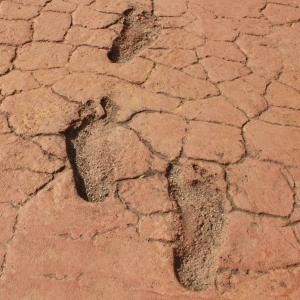
Image via val lawless / Shutterstock.com
El Camino del Inmigrante (the way of the immigrant) is the name of an upcoming 150-mile walk from the California-Mexico border to Los Angeles, arriving in time for the annual Christian Community Development Association conference. Participants in the conference and Southern California residents — immigrants and citizens — will walk together for ten days to remember and to lift up the suffering of migrants as well as their contributions to our country.
'Guardian Angels' in Immigration Court
The boy is terrified. He has come thousands of miles running from terrible danger. He has encountered horrors on the way, riding on top of “La Bestia,” the train that carries migrants from Central America through Mexico. He stands in an immigration courtroom and hears the irritated judge threaten him with deportation because he has not been able to find a lawyer. He is staying with distant relatives as he goes through the court process, and they are barely able to feed the extra mouth, let alone pay for a lawyer for him. He is facing the very real possibility of being sent back into territories controlled by the Mara Salvatrucha, the organized crime syndicate that murdered his cousin and has threatened to kill him and his family if he doesn’t join up. He knows that they are likely to make an example of him. He feels terribly alone. Even though the translator speaks his language, he feels like no one in this strange land understands the cry of his heart.

